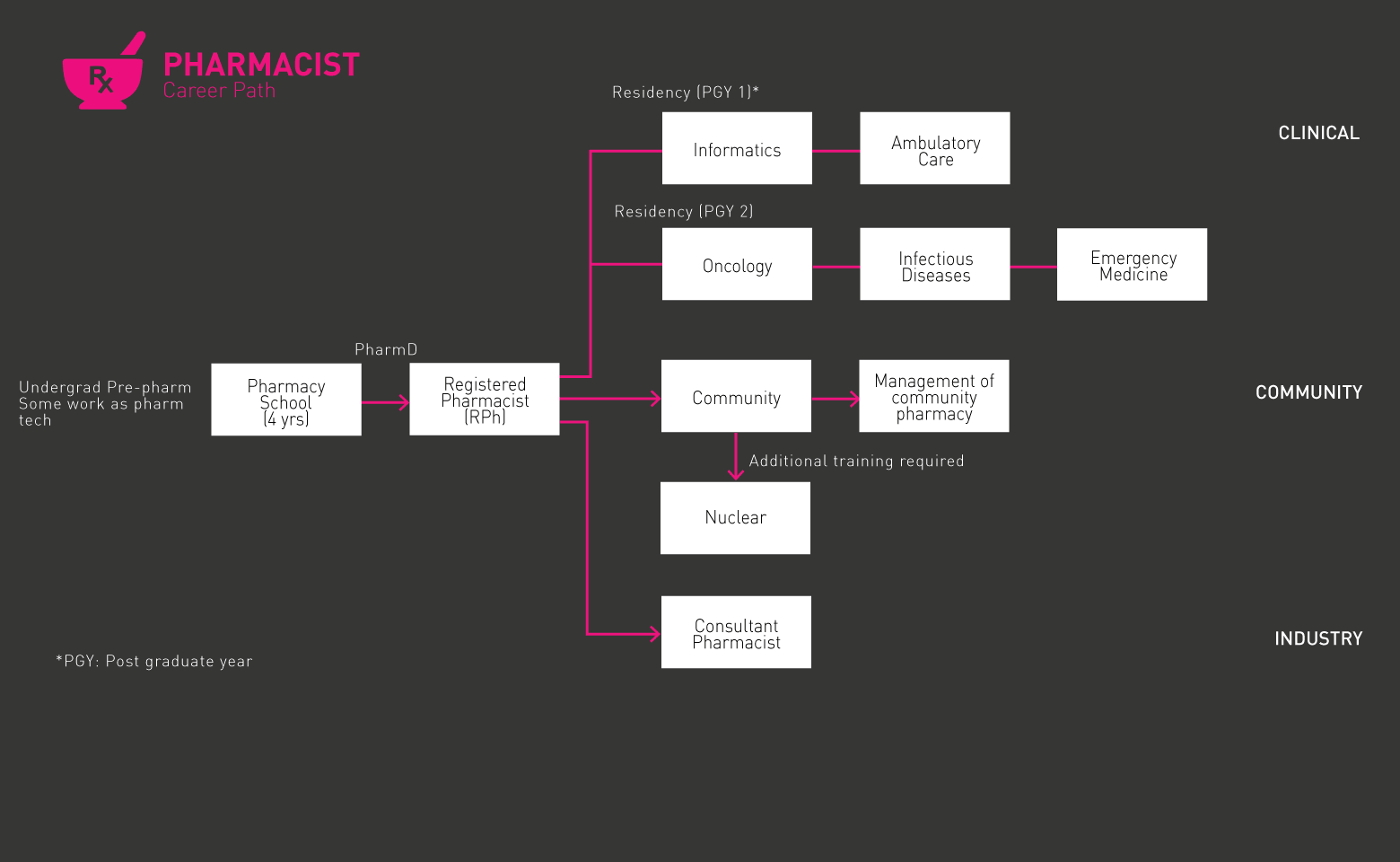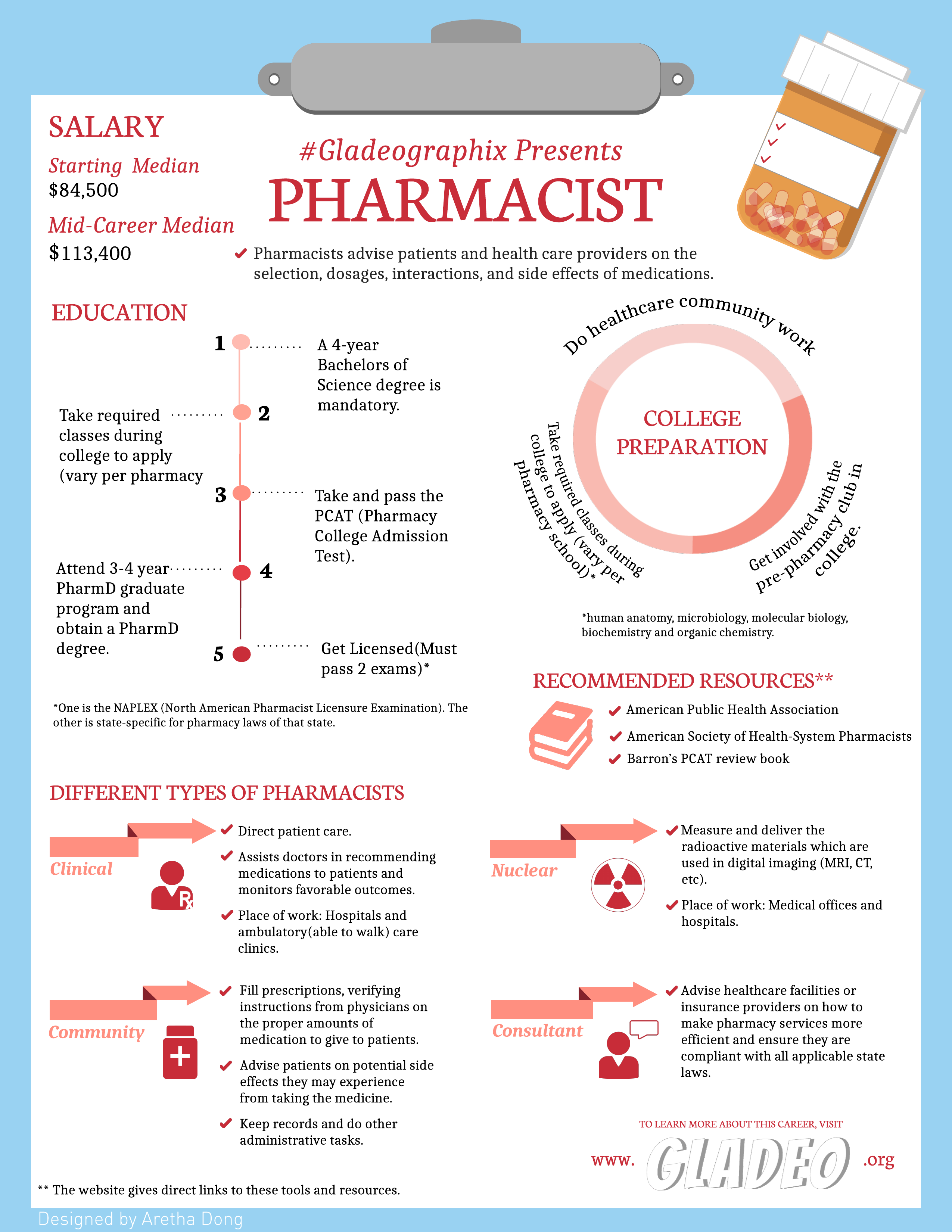Прожекторы
Clinical Pharmacist, Hospital Pharmacist, Informatics Pharmacist, Pharm D (Pharmacy Doctor), Pharmacist in Charge (PIC), Pharmacy Coordinator, Pharmacy Informaticist, Pharmacy Services Clinical Coordinator, Registered Pharmacist, Retail Pharmacist
Pharmacists advise patients and health care providers on the selection, dosages, interactions, and side effects of medications.
- Job security
- Excellent pay
- Flexibility: You can work part-time and still make a good living.
- Making a positive impact on a patient’s health.
Community Pharmacists
- Fill prescriptions, verifying instructions from physicians on the proper amounts of medication to give to patients.
- Check whether the prescription will interact negatively with other drugs that a patient is taking or conditions the patient has.
- Instruct patients on how and when to take a prescribed medicine.
- Advise patients on potential side effects they may experience from taking the medicine.
- Advise patients about general health topics, such as diet, exercise, and managing stress, and on other issues, such as what equipment or supplies would be best for a health problem
- Complete insurance forms and work with insurance companies to be sure that patients get the medicines they need.
- Oversee the work of pharmacy technicians and pharmacists in training (interns).
- Keep records and do other administrative tasks.
- Place of work: Community pharmacies (chains like CVS and independent pharmacies), hospitals.
- Downside: Will probably have to work weekends.
Clinical Pharmacists
- Direct patient care. Assists doctors in recommending medications to patients and monitors therapeutic outcomes.
- Place of work: Hospitals and ambulatory care clinics.
Nuclear
- Measure and deliver the radioactive materials which are used in digital imaging (MRI, CT, etc).
- Place of work: Medical offices and hospitals.
Consultant Pharmacists
- Advise healthcare facilities or insurance providers on how to make pharmacy services more efficient and ensure they are compliant with all applicable state laws.
- Lots of schooling!
- Will be on your feet for many hours of the day.
- Might work nights/weekends.
- For the past 10 years or so, pharmacy has been moving towards getting even more involved with direct patient care meaning there are more clinical pharmacists.
- Knowing more than one language is quite useful, especially Spanish. “I can't tell you how many times I've needed a translator when trying to communicate with patients!” – Tony Bui, Licensed Pharmacist
- The industry is continuing to grow and that there's still a demand for pharmacists; however, because more and more pharmacy schools keep opening up, it's only a matter of time before the market might get too saturated.
- Pharmacists need a Doctor of Pharmacy (Pharm.D.) degree plus state licensure. There is no specific undergraduate major needed, but undergrad studies must sufficiently prepare students for a Pharm.D. program
- Most Pharm.D. programs require applicants to send Pharmacy College Admission Test (PCAT) scores. The PCAT helps schools determine which applicants are qualified and prepared for the academic rigors of a Pharm.D. program
- Common courses include biology, chemistry, math, pharmacology, medical ethics, and physics. Supervised work experiences (aka internships) in hospitals or pharmacies are also a program requirement
- Pharm.D. programs can take from 3-4 years, though there are also “0-6” routes for high school graduates to enter straight into a 6-year program. Another option is an “early assurance” (or “early admission” program for transfer students
- Per the American Association of Colleges of Pharmacy, “Colleges and schools of pharmacy require criminal background checks and drug testing as part of the admissions or enrollment process”
- Pharm.D. degrees programs must be accredited by the Accreditation Council for Pharmacy Education
- Graduates of Pharm.D. programs must complete continuing education to stay up-to-date on changes in the field
- All Pharmacists are licensed in the states where they work. Licensure requires passing two exams — the 225-question North American Pharmacist Licensure Examination (NAPLEX) and either the Multistate Pharmacy Jurisprudence Exam or a state-specific exam (such as California’s CPJE). Completed internship hours are also a requirement of licensure, but requirements vary by state
- Pharmacists may become certified via the American Pharmacists Association’s Pharmacy-Based Immunization Delivery program to administer vaccines and immunization shots
- Other certifications include:
- Certification Board for Diabetes Educators - Certified Diabetes Educator
- Board of Pharmacy Specialties -
- Certification in Compounded Sterile Preparations Pharmacy
- Certified Ambulatory Care Pharmacist
- Certified Cardiology Pharmacist
- Certified Critical Care Pharmacist
- Certified Geriatric Pharmacist
- Certified Infectious Diseases Pharmacist
- Certified Nuclear Pharmacist
- Certified Nutrition Support Pharmacist
- Certified Oncology Pharmacist
- Certified Pediatric Pharmacy Specialist
- Certified Pharmacotherapy Specialist
- Certified Psychiatric Pharmacist
- National Association of Specialty Pharmacy - Certified Specialty Pharmacist
- NAPLEX pass rates: Shows the percentage of students who passed the board examinations for each school.
- % of students that do a residency (if you’re interested in being a clinical pharmacist).
- National ranking is not as important.
- Take college prep classes in high school, including biology, chemistry, math, physics, English, and communications
- Get involved with the pre-pharmacy club in college.
- Do healthcare community work (i.e. diabetes and blood pressure screenings).
- Map your career goals and educational milestones in advance. Consider which areas you might want to specialize in
- Ask working Pharmacists if you can do an informational interview with them
- Read or watch interviews with Pharmacists and take notes on important tips
- Review job ads well ahead of time to learn more about the qualifications employers are looking for
- Volunteer with local healthcare-related community organizations
- Knock out your intern hours in college via required rotations, and make sure you understand your state’s requirements completely. Check out the Boards of Pharmacy for updates
- Participate with relevant college clubs and professional organizations

- After graduating from an accredited Pharm.D. program and meeting state practice hour requirements, you can apply for initial licensure
- Sign up for your North American Pharmacist Licensure Examination (NAPLEX) and Multistate Pharmacy Jurisprudence Exam or state-specific exam!
- Apply for licensure in all the states you want to potentially work. You can use a score transfer or licensure transfer (reciprocity) process for getting licensed in more than one state
- Considering getting certification so you can specialize in a field and boost your credentials
- Typically during your 4th year (P4), the pharmacy school will host a job fair. This is the best opportunity to get as many interviews in one day. If you know you want to work for a specific company early on, you should get a job as a technician/intern while in school. They typically offer jobs to their own employees first before they will consider others.
- Build strong connections while doing internships. Keep an eye open for job opportunities
- Look for jobs and internships on Indeed, Simply Hired, Glassdoor, or other popular job portals
- Ask your professors and alumni network for job-seeking tips
- See if your program offers job placement assistance with hospital or pharmacy partners
- There will always be a need for Pharmacists, but the Bureau of Labor Statistics notes that mail order/online prescription services may be cutting into the number of project jobs. BLS points out that demand may grow in hospitals and clinics versus retail pharmacies or drug stores
- The states with the highest concentration of jobs for Pharmacists are West Virginia, South Dakota, North Dakota, Alabama, and Kentucky. The highest employment levels are in California, Texas, Florida, New York, and Pennsylvania
- Check out Pharmacist resume templates for ideas on formatting and phrasing
- Review sample Pharmacist interview questions and practice mock interviewing
- Remember to dress for interview success!
- Excellent leadership qualities
- Results-driven
- Self-motivated
- Good time management skills
- Genuine interest in pharmacy
Сайты
- Accreditation Council for Pharmacy Education
- Accreditation Council for Pharmacy Education
- American Association of Colleges of Pharmacy
- American Association of Pharmaceutical Scientists
- American College of Clinical Pharmacy
- American Pharmacists Association
- American Society of Health-System Pharmacists
- Association of Diabetes Care and Education Specialists
- Board of Pharmacy Specialties
- Certification Board for Diabetes Care and Education
- National Association of Boards of Pharmacy
- National Association of Chain Drug Stores
Книги
- Core Concepts in Pharmacology, by Leland Holland, Michael Adams, et al.
- Introductory Clinical Pharmacology, by Susan M Ford
- Pharmacology Made Incredibly Easy, by Lippincott Williams & Wilkins
Alternate careers: Nurse, Physician Assistant, Pharmaceutical Representative.
“Try to find a pharmacy that will allow you to shadow a pharmacist for a few days. This will help you figure out if pharmacy is for you. Do not limit yourself to just a community pharmacy. That setting is not for everyone.” – Tony Bui, Licensed Pharmacist
Лента новостей

Популярные вакансии

Онлайн-курсы и инструменты









